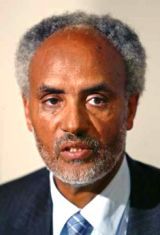Seeing gains, Ethiopian opposition backs off boycott threat
ADDIS ABABA, May 16 (AFP) — Buoyed by early returns suggesting significant gains in the capital, Ethiopia’s opposition on Monday backed off a threat to reject nationwide results from hotly contested weekend elections.

|
|
Ethiopia’s opposition leader Beyene Petros of the United Ethiopian Democratic Forces. (Reuters). |
As vote counts from more than 30,000 individual polling stations trickled in, independent observers said Prime Minister Meles Zenawi’s ruling party had lost parliamentary seats, including two held by ministers, in Addis Ababa.
Local pundits said it appeared the opposition Coalition for Unity and Democracy (CUD), whose four member parties had no seats in parliament, could have won at least ten to 13 of the 23 seats allocated to the capital.
CUD officials put the figure higher and as election authorities hailed Sunday’s poll as “very successful” with no problems other than logistical hitches and long waits, they toned down their boycott rhetoric.
Instead of a blanket refusal to accept all results, they said would protest specific irregularities and ask for new votes to be held in places where they allege problems were particularly egregious.
“I think the decision will come to a compromise to complain around certain areas around Ethiopia,” said Hailu Shawl, head of the Coalition for Unity and Democracy (CUD), who had earlier urged his group to consider a blanket boycott.
“It is not a right out rejection of all the election results around the whole country, it is in specific areas where we will complain,” he told AFP. “I think we should focus more on the areas where we had problems.”
“We have specific areas where the elections have to be redone,” Hailu said, citing the eastern region of Afar as one such place where he claimed opposition supporters had not been allowed to vote.
“In the area where I was, the CUD had 85 percent of the vote in many polling stations,” said one international observer. “It’s an unheard of mini-revolution for the opposition.”
Hailu gave no explanation for the climb-down but it came as election observers expressed doubts about the complaints and diplomats said the opposition had done well in the capital, where demonstrations have now been banned.
“Based on the first results in Addis Ababa, we expect to see a boost for the opposition in the capital,” said one western diplomat.
“The question now is will the government accept the results,” the diplomat told AFP on condition of anonymity. “If the opposition scores well only in Addis, it should, but if they do well everywhere, it will never accept it.”
Most believe, though, that Meles’ ruling Ethiopian People’s Revolutionary Democratic Front (EPRDF) won a third term in the polls due in part to support from rural areas where 85 percent of the country’s 70 million people live.
Thus, Meles took many aback late Sunday by banning all demonstrations in and around the capital for 30 days and taking direct control of the security forces even though the polls had been peaceful.
Meles said the moves were necessary to counter “havoc” and “fear” created by the opposition but stressed they were only a precaution and did not preclude filing complaints about the polls.
Still, the measures appeared draconian to some given the unprecedented openness of the campaign.
“I was surprised by the his strong tone because yesterday was remarkably calm,” said a second diplomat. “It’s a preventative measure because everyone thinks that it will be very delicate when the results are announced.
“Like everyone, Meles fears the moment when the results are released, but I don’t think it will affect the democratic process.”
The first official comprehensive preliminary returns are not set to be released until May 21, but groups can compile their own aggregates before by tabulating the posted results at individual polling stations.
Meanwhile, election officials said more than 90 percent of the country’s 26 million registered voters had cast ballots and apologized for lengthy balloting delays many endured because of the crush.
“We had a very successful election yesterday, it was very peaceful, a very high voter turnout was registered,” said Kemal Bedri, chief of the National Electoral Board of Ethiopia (NEBE).
“We faced a few problems but I wouldn’t categorize them in any way as major ones,” he told reporters, referring to ballot shortages, the distribution of incorrect voting materials to some polling stations and the long waits.
“We apologize for the inconvenience we caused to these voters,” he said, adding however: “This election has shown us that Ethiopians cherish democracy and that democracy is here to stay.”
Voters at one polling station in Addis Ababa waited in line until 5:00 am (0300 GMT) Monday, nearly 12 hours past scheduled closing time, to cast their ballots, Kemal said, thanking them for the patience.
